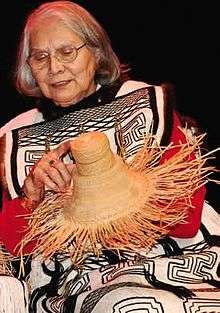Delores Churchill
Delores E. Churchill (Haida: Ilskyaalas)[1] is a Native American artist of Haida descent. She is a weaver of baskets, hats, robes, and other regalia, as well as leading revitalization efforts for Haida, her native language.

Background
Churchill was born in Masset, Queen Charlotte Islands[2][3] (now Haida Gwaii) in British Columbia, Canada in 1929. As a girl, she attended residential schools that forced her to speak English in place of her native tongue, a typical practice of that time period. She first studied traditional Haida weaving with her mother, Selina Peratrovich, who is also a nationally recognized master weaver. She went on to study traditional Tsimshian weaving from masters Flora Matthew and Brenda White.[4] Churchill further studied at the British Museum and relearned the six-strand weave.[5] After retiring from a bookkeeping career and raising her family, Churchill turned her attention back to basketry at a time when Haida basket weaving was in serious decline as an art form among younger members of the tribe.[2] She taught her niece, Lisa Telford, traditional Haida basket weaving.
Artwork
Churchill is known for her utilitarian and ceremonial objects that often use spruce root, cedar bark, wool, and natural dyes. Some of her artwork is displayed at the Totem Heritage Center in Ketchikan, Alaska, where she has also taught courses in basketry.[6]
Haida language revitalization
As one of the few remaining native speakers of Haida, Churchill has fought to share her linguistic heritage. Canada and the United States both suppressed use of the Haida language, especially through forcing Native children to speak English in boarding schools. Churchill was forced by her teachers in the Canadian residential school she attended as a child to speak English and was punished for speaking her own language. Despite these challenges, Churchill has remained adamant in her desire to preserve her native language and frequently works with Haida children and assisted her daughter April Churchill's language revitalization.[7]
Honors and awards
Churchill is the recipient of numerous awards, including:
- National Heritage Fellowship Award, National Endowment for the Arts[8]
- Lifetime Achievement Award, Central Council of Tlingit and Haida Indian Tribes of Alaska[5]
- Alaska State Council on the Arts fellowship[5]
References
- "Edge of the Knife: Three to the power of all". Council of the Haida Nation. 2 May 2017. Archived from the original on 13 May 2018. Retrieved 11 May 2018.
- "Delores Churchill". Kenai River Council on The Arts. 2003. Archived from the original on July 7, 2011. Retrieved November 5, 2009.
- Denning, Angela (October 15, 2015). "Haida master weaver Delores Churchill shares her story". KFSK. Retrieved July 27, 2017.
- "Folk Arts: Master Artist Delores Churchill". Washington State Arts Commission. Archived from the original on July 24, 2008. Retrieved April 28, 2019.
- Dudzak, Maria (May 5, 2017). "Delores Churchill honored with Lifetime Achievement Award". KRBD. Retrieved July 27, 2017.
- http://www.city.ketchikan.ak.us/departments/museums/documents/InstructorBiosforweb.pdf
- "Northern Northwest Coast Weavers". Burke Museum. 2001. Retrieved 11 July 2018.
- "Delores Churchill Haida traditional weaver". National Endowment for the Arts. Archived from the original on 2008-03-30. Retrieved 2008-08-07.